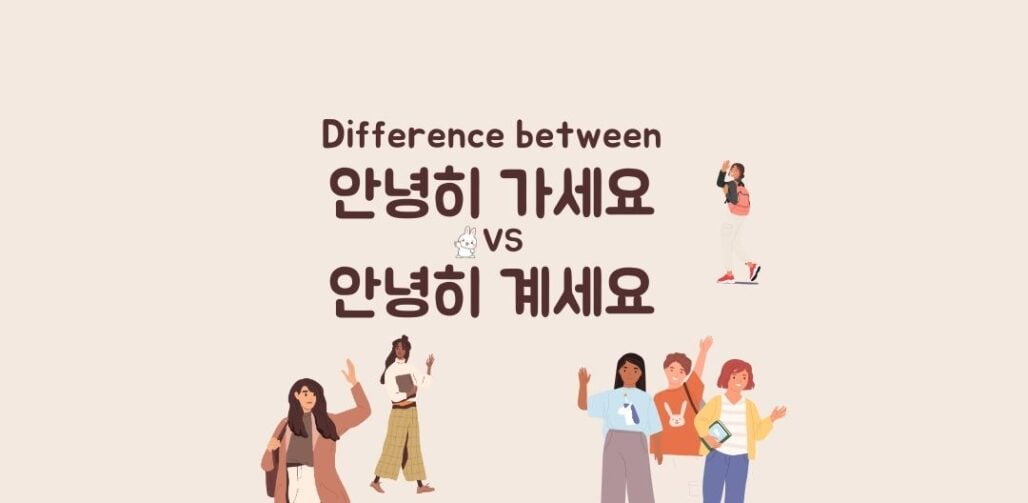안녕히 가세요 and 안녕히 계세요 both are used as greetings when you say goodbye to others. However, the two words are used a little differently. Let’s learn the basic differences between the two similar phrases and how to correctly use them right now.
Differences: 안녕히 가세요 vs 안녕히 계세요:
There are main differences in the meaning and usage of the two phrases. Let’s look at them now.
Differences In Meaning:
안녕히 가세요
/an-nyeong-hi ga-se-yo/
안녕히 가세요 is comprised of two words.
- 안녕히
- 가세요 [가다 + (으)세요]
1. 안녕히- It is an adverb.
This means 몸이 건강하고 마음이 편안하게 in Korean translating to “so that your body is healthy and relaxed.”
The meaning of this word is considered to be “being in peace.”
2. 가세요: It’s a conjugated form of the verb 가다 with grammar ending (으)세요.
- 가다 means to go.
- A/V-(으)세요 is a grammar ending used for purposes given below:
1. As an Honorific ending to show respect. [In this case, it’s used for this purpose.]
2. For giving orders or making requests politely.
3. For giving instructions formally.
안녕히 계세요
/an-nyeong-hi gye-se-yo/
안녕히 계세요 is comprised of two word.
- 안녕히
- 계세요 [계시다 + 아/어요]
1. The meaning 안녕히 has already been discussed above.
2. 계세요: It’s a conjugated form of 계시다 with grammar ending -아요/어요.
- 계시다: ’계시다’ is the honorific equivalent of ‘있다’.
-One of the meanings of the verb ‘있다’ is “to exist/to be/to stay”. It’s used with objects, friends, or people of a lower social status than us.
– For superiors; or people of a higher social status, the more formal ‘계시다’ is used. - Adjective/Verb+ 아요/어요: It is a Present tense grammar ending.
[ 계시다 + 어요/어요= 계셔요/ 계세요 ]
When ~아/어요 is added to 계시다, the conjugation 계셔요 is formed which is equivalent to “계세요.”
Differences In Usage:
안녕히 가세요
“안녕히 가세요” is used to say goodbye to someone who is leaving.
By saying 안녕히 가세요 (in peace), you’re wishing that the other person who is leaving be healthy and relaxed. In short, to go in peace.
안녕히 계세요
안녕히 계세요 is used when you’re the one leaving and the person you’re saying goodbye to is not going anywhere, you say 안녕히 계세요.
By saying 안녕히 계세요 (stay in peace), you’re hoping that the other person who is staying to be healthy and relaxed. In short, to stay in peace.
How To Say Goodbye To Your Friends Or People Younger To You?
There are phrases in informal speech to use in place of the formal greeting Goodbye in Korean. They can be used when you’re saying goodbye to your friends or someone younger than you or of lower status than you.
안녕히 게세요: “잘 가” is its informal equivalent.
안녕히 계세요: “잘 있어” can be used in place of its formal counterpart.
Common Mistakes Made When Using 안녕히 가세요 And 안녕히 계세요:
I’ve seen people get confused about what to say when you’re also leaving. You don’t need to think of what you are doing as any part of it. It entirely has to do with what the other person is doing. If they are leaving (regardless of whether you are also leaving) you still need to say 안녕히 가세요.
Simply because it’s a greeting to say goodbye.
안녕히 계세요 is used when you’re the one leaving and the person you’re saying goodbye to is not going anywhere, you say 안녕히 계세요.
| Phrases | 안녕히 가세요 [Annyeonghi gaseyo] Goodbye [go in peace] | 안녕히 계세요 [Annyeonghi gyeseyo] Goodbye [stay in peace] |
|---|---|---|
| Meaning | 안녕히 가세요 is comprised of two words. 안녕히 and 가세요[가다 + (으)세요] 안녕히 is an adverb. -It means 몸이 건강하고 마음이 편안하게 (so that your body is healthy and relaxed) which equals to being in peace. 가세요[가다 + (으)세요] 가다– To go (Verb) A/V-(으)세요 grammar ending is used for- 1. honorific ending to show respect. [Here it’s used for this.] 2. giving orders or making requests politely. 3. giving instructions formally. | 안녕히 계세요 is comprised of two words- 안녕히 and 계세요 [계시다 + 아/어요] The meaning 안녕히 remains the same which is to be in peace. 계세요 [계시다 + 아/어요] 계시다– ’계시다’ is the honorific equivalent of ‘있다’. • One of the meanings of the verb ‘있다’ is “to exist/to be/to stay”. It’s used with objects, friends or people of a lower social status than us. • For superiors, or people of a higher social status, the more formal ‘계시다’ is used. Adj/V + 아/어요 ending- Present tense grammar ending 계시다 + 어요/어요= 계셔요/ 계세요 – When ~아/어요 is added to 계시다, the conjugation 계셔요 is formed which is equivalent to “계세요.” |
| Usage | “안녕히 가세요” is used to say goodbye to someone who is leaving. [I’ve seen people get confused about what to say when you’re also leaving. -You don’t need to think of what you are doing as any part of it. It entirely has to do with what the other person is doing. If they are leaving (regardless of whether you are also leaving) you still need to say 안녕히 가세요. Simply because it’s a greeting to say goodbye.] | 안녕히 계세요 is used when you’re the one leaving and the person you’re saying goodbye to is not going anywhere, you say 안녕히 계세요. By saying 안녕히 계세요 (stay in peace) you’re hoping that the other person who is staying to be healthy and relaxed. In short to stay in peace. |
| Informal | “잘 가” is its informal equivalent. | “잘 있어” can be used. |
When I started learning Korean and learned these terms at first I was really confused about the differences between the two since they seemed the same to me as beginner student of Korean language.
Hope it was helpful 🙂



